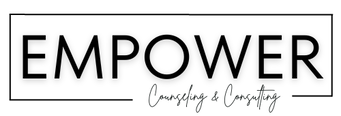The Whole30 team can warn you all day that it’s not about weight loss, but it is still your responsibility to know your own triggers. I’m seeing a lot of people gearing up for their September Whole30 adventure- cleaning out fridges, stocking up pantries, eating one last pizza and tub of ice cream before they have to give it up for 30-45 days (or possibly longer). (This is totally not recommended by the way! But I know y’all are doing it! :) Seeing all of these posts on Instagram really has me thinking and I want to share some thoughts as a former Whole30 Certified Coach and as a therapist with experience working with disordered eating. I want to look at both the benefits and, more importantly, the potential dangers of a program like this for this particular population. First let me share with you my background with W30. I have done several rounds personally and I have learned so much about my body, the way it tolerates food, and how certain foods impact my physical and mental health (yes! Your anxiety might have a lot to do with your diet!). After completing the rigorous requirements, I became a certified coach in January of 2019. (Trust me- they are not just handing these certifications out.) I hosted several group challenges over the next 18ish months, helping Whole30ers navigate the rules of the program, find motivation to stay the course, and get in touch with emotions as they became more aware of their relationship with food. It is hard work. I saw my group members come off of a multitude of medications they had taken for years, their lab work astonished their doctors, they were able to move their bodies and their joints in ways they hadn’t been able to (pain free) in decades, their sleep issues were resolved, the list goes on and on. I’m not exaggerating here. The results can seem miraculous. The power that the Whole30 program holds is simply based on the science that nutrition can either make or break your body in so many different ways. But here’s my problem: On day 31, there would always be at least one (often more) group member that would say to me, “My sleep is great, my energy is great, my digestion is great, I’m off of my meds, I’m running again...but ...I didn’t lose as much weight as I had hoped. It’s really disappointing. What can I do next to help with that? Should I stay on Whole30 longer and also start _____?” (fill in the blank with something like count calories, eat less fat, exercise more, eat less red meat, etc.) The fact that there was a “but” after they listed so many good things was always heartbreaking. Their solution was always more restricting. The Whole30 team will tell you over and over again that it is not a weight loss diet, should not be used as a means of losing weight, and if that is your goal, you need to find another way. But people don’t listen. People miss/ignore that part. They use the program incorrectly over and over again. (I was 100% guilty of this btw. Prior to becoming a coach, I didn’t read this part of the rules and regulations and I totally used it as another crash diet). So while I AM a supporter of the program, the team, the supportive community, and especially of using nutrition as a way of caring for your body and reversing/preventing chronic illness, I have serious concerns about people with a history of an eating disorder or disordered eating habits attempting the program. Whole30, by specific and scientific design, eliminates certain food groups that have the potential to cause intolerances in the body. The best way to see if a food is impacting you negatively? Remove it and see if you feel better! But, if you have a history of restricting your diet in any fashion that has led to disordered patterns, this experiment can be extremely triggering. Patterns in the past have labeled food “good” and “bad” and those labels become internalized depending on your plate. You are good when you eat good. You are bad when you eat bad. This becomes a deep core belief you have about yourself and it is very damaging. Whole30 is not saying a food group is “bad” but with a history of this kind of thinking, it’s incredibly difficult to separate your own disordered patterns from the intentions of the program. Healing from disordered eating includes taking the moral label off of food, having no restrictions around your food intake (unless advised by a physician), and healing from the need to control every bite that you consume. And you’re just not able to do that if you are trying to complete Whole30. Does it mean that you couldn’t benefit from Whole30? I’m not necessarily saying that either. You could complete the program with absolute perfection, follow the guidelines and meal templates to a T, and possibly (probably) have some of those wonderful results by the end. But in all likelihood, there is also a good chance it could send you into a shame spiral and harmful, restrictive patterns could resurface. And listen to me when I say- IT IS NOT WORTH IT. Again, I am not saying Whole30 is bad by any means. I’m still a big fan. I’m saying- for some people- the requirements are too similar to previously damaging patterns and this could be a bad idea for you. The Whole30 team can warn you all day that it’s not about weight loss, but it is still your responsibility to know your own triggers. If you are considering doing Whole30 and have a history of disordered eating or a diagnosed eating disorder, please reach out to your therapist and explore what is prompting that desire in their first place. It may be your eating disorder that is driving the decision to use this as a “healthy” way to restrict. If you are determined to do the program, please at least see your therapist weekly while you are doing it. Don’t go at this alone. It may seem like I’m making too big of a deal out of it, but I can assure you I’m not. Nothing is worth your peace and mental health. It needs to be protected at all cost here. Julie HiltonJulie is a Licensed Clinical Social Worker providing psychotherapy in person (Alpharetta) and online anywhere in Georgia. She specializes in helping empower women to shed the pressures and expectations of the world, and find peace in the identity God intended. If you are interested in working with Julie and would like to scheduled a free phone consultation, call 678-329-9129 today!
3 Comments
Rachael Mildred
9/23/2023 08:39:02 pm
EFFECTIVE LOVE SPELL TO GET EX HUSBAND/BOYFRIEND OR EX WIFE/GIRLFRIEND AND CURE HERPES AND INFERTILITY THAT WORKS WITHIN 24 HOURS.
Reply
Joe Arthur
5/27/2024 04:22:50 am
I was paid $30 per hour at work and it was a stressful job, I was researching online for a better job when I saw testimonies of how Dr Uyi helped people with his spell to win lottery. I have not played the lottery game before so I wondered how it works, I spoke to Dr Uyi asking for help to win the lottery game too. He responded and requested for my name and picture, I did as he instructed and the items were bought to cast the spell, after the casting of the spell he gave me a lottery number which was revealed to him by the gods when he was casting the spell. I played the lottery numbers and two days later I got an email that I won 139 million dollars($139,000,000). I thought it was a joke but behold I got paid without stress. Dr Uyi is a great Psychic, join me thank him. You can also contact him via email: [email protected] OR on FACEBOOK https://www.facebook.com/profile.php?id=61557911605591
Reply
Angel Castor
7/5/2024 07:41:43 am
I'm Angel Castor from the US. White Caucasian Female. I'm 43 years old and I got married at the age of 25, I have only two children and I am living happily.
Reply
Leave a Reply. |
Julie
|


 RSS Feed
RSS Feed